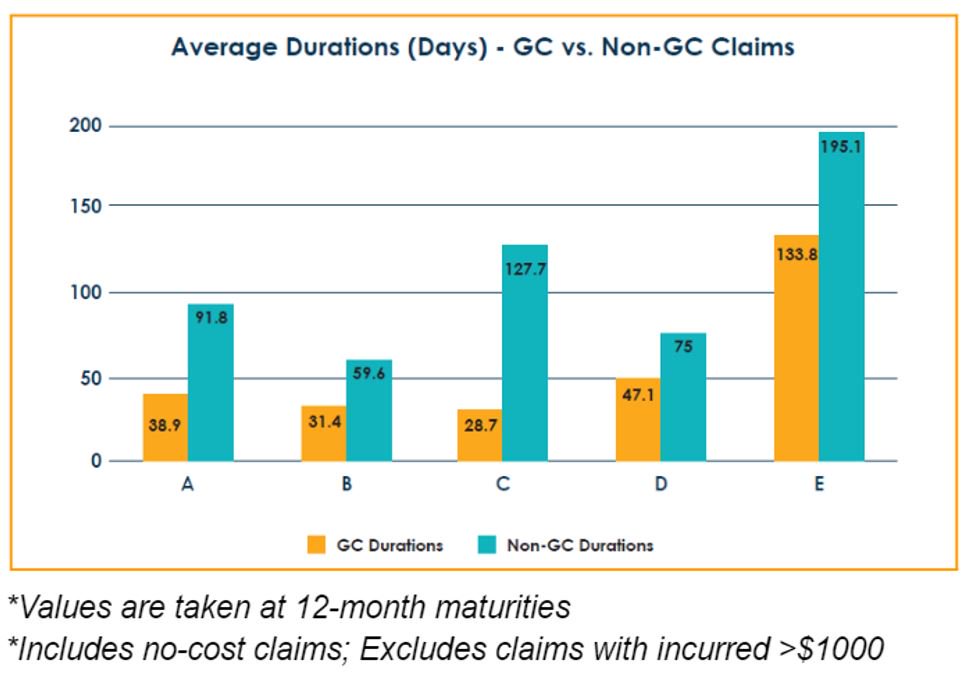By: Gary Leonard, Jenny Kastenholz

Jul 23, 2024 — For retailers, the frequency of customer claims is high; however, the complexity is generally low. In fact, about 90% of all retail claims will settle for under $1,000, providing a sound argument for the implementation of a fast-track adjudication approach to claims management. (Griffin 2009) Settling a claim during the first call (ideally with a gift card), if possible, not only encourages returning to the store but also boosts customer satisfaction and prevents the claim from developing further.
Did you know that two out of three customers will spend 38% more than the value of the gift card when it is redeemed? (Retail Gift Card Association 2022) Using gift cards in fast-track teams can effectively prevent an incident from evolving into a claim while also protecting brand reputation, but identifying the strategy that makes the most sense for your business can be a challenge. Leveraging Gallagher Bassett's vast amount of retail data, we conducted a study to highlight four strategies retailers use to settle claims and the outcomes they see as a result.
The Study
We chose five Gallagher Bassett clients with varied approaches to their gift card programs. Clients in this study spanned different areas of the retail sector, including specialty and big-box grocers, personal care and beauty, and specialty retail. Each retailer placed limits on the denominations of gift cards that claim handlers could issue without consultation, and the gift cards ranged from $100 to $2,000. Although these firms may have had little in common aside from the retail industry classification, four distinct strategies geared toward administering gift card programs were on display.
- Optimistic gift card strategy: Retailers A and D had a much higher gift card use rate than the other clients studied. Consequently, gift card closures for these retailers made up a full one-fifth of their total claim closures. These retailers embraced gift cards as a tool to assist in driving claim closures and controlling costs and went to great lengths to make gift card use a part of their everyday claim handling best practices.
- Discretionary gift card strategy: Retailers C and E opted for a more constrained deployment of gift cards. These retailers understood the utility of gift cards to settle and close claims but chose to use gift cards on a case-by-case basis instead of instituting a strict rules-based gift card program. The average gift card issuance for these retailers was higher than that of retailers A and D, and the range of average gift card payments ($103 vs. $176) speaks to the discretionary nature of their strategy. However, the frequency with which these retailers used gift cards was lower than that of their peers and accounted for a smaller proportion of total claim closures than for A and D.
- Conservative gift card strategy: Retailer B was the only retailer in this study that implemented a Conservative approach to gift card usage. Indeed, gift card closures for this retailer accounted for only 1% of its entire book of claims. This retailer's gift card program was prescriptive, with well-defined rules regarding the types of claims eligible for gift cards and the gift card amount available to use. It is no surprise that this retailer's average gift card issuance was the lowest of the five included in this study.
- Impact of gift card strategy on claim durations: We took our study one step further and analyzed the impact of these strategies on claim durations. For all five retailers examined here, gift card claims, on average, settled quicker than traditional settlements for similar claims: three of the five retailers were able to resolve gift card claims in fewer than 40 days. Discretionary retailers C and E had the longest durations for non-gift card closures; as such, the impact of reduced durations from gift card closures was even starker. Retailer C, in particular, closed gift card claims 78% faster than non-gift card closures.

What's Driving These Results?

We identified several factors that affect overall gift card outcomes, including settlement authority for gift card cases, investigative requirements, release requirements, and claim handler denial authority.
Retailers A and D had an Optimistic approach to gift cards. Gift card authority for these retailers ranged from low to middle levels, and investigatory requirements were limited (more so for retailer D). Each retailer required a release and an estimate for property damage claims. Retailer A had limited denial authority, while Retailer D had no denial authority. Overall, the gift card programs of these two retailers were very similar and yielded similar results.
Retailers C and E both use a Discretionary approach to gift cards, but their respective philosophies toward their gift card programs were quite different:
- Retailer C had very high settlement authority for gift card claims ($2,000). Claim investigations were claimant-contact only, while individual stores were responsible for some of the investigatory burden for gift card claims. Release requirements were Discretionary and claims handlers had full denial authority. Under this methodology, average duration for gift card closures for Retailer C was 78% faster than non-gift card closures, which marks the greatest differential in our study.
- The gift card settlement authority for Retailer E was low, at $250. The investigation was limited to claimant-contact with no additional support from stores, unlike Retailer C. There was no explicit guidance on whether an estimate was required for property damage claims, and releases were required for all settlements. Lastly, Retailer E did not provide denial authority for gift card claims. The results of its overall approach (Discretionary) and claims handling practices toward gift cards led to low gift card utilization, high average gift card payments, and relatively long gift card claim durations.
Finally, Retailer B was the only retailer with a Conservative approach to gift cards. Its settlement authority was limited to $100 for gift card claims, the lowest in our study. However, due to its low settlement authority, this retailer was able to loosen the reins on the rest of its gift card claims handling practices. The investigations were limited to claimant-contact, and an estimate was not required for settlements lower than $250 — meaning that gift card settlements would never require an estimate. Additionally, no release was required on gift card settlements, and claims handlers had full denial authority.

Conclusion
From a claims perspective, implementing a thoughtful gift card program strategy could help streamline your claims process, increase brand affinity, and retain customers to sustain your business in the long term. If you're planning to institute a gift card program as part of your strategic approach to claims adjudication, take a moment to consider where gift cards might fit into your overall claims strategy. Contact our team to discuss your current needs and how we can help your retail business achieve superior outcomes in the future.
Authors

Gary Leonard

Jenny Kastenholz
Sources
Griffin, Scott. 2009. Settling Claims on the Fast Track. 14 January. https://www.claimsjournal.com/news/national/2009/01/14/96972.htm.
Retail Gift Card Association. 2022. Gift Card Industry Research. February. https://www.thergca.org/RGCA/Member%20Center/Resources/Research/RGCA/Resources/NewsResearch/Research/Research.aspx.
Make Gallagher Bassett your dependable partner
When making the right decision at the right time is critical to minimize risk for your business, count on Gallagher Bassett's extensive experience and global network to deliver.

